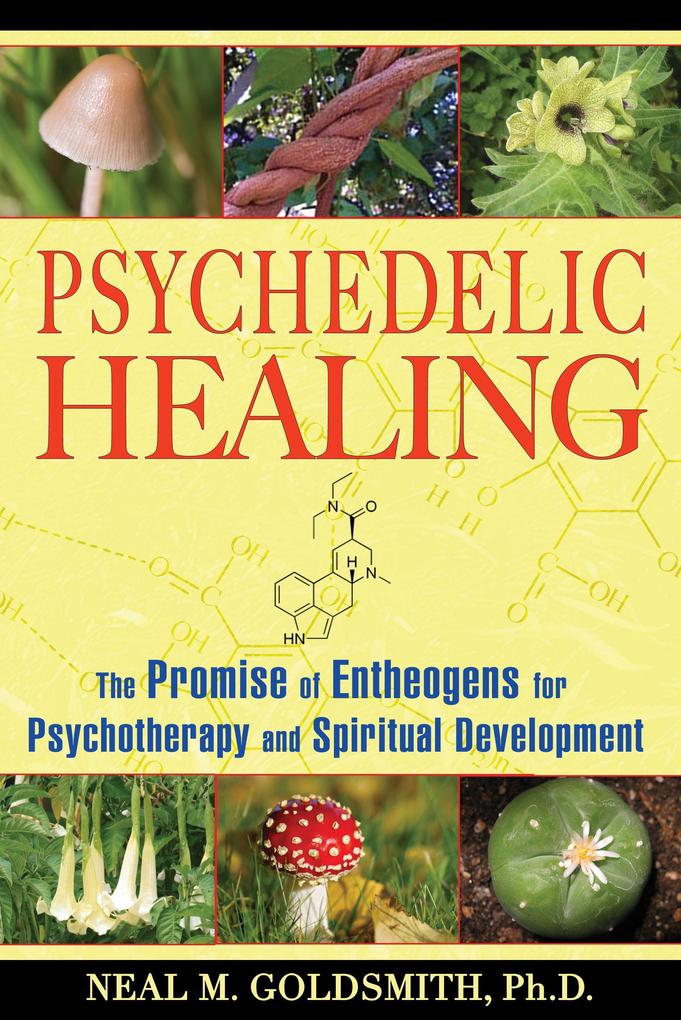
Zustellung: Fr, 07.02. - Mi, 12.02.
Versand in 3 Wochen
VersandkostenfreiBestellen & in Filiale abholen:
ENTHEOGENS / HEALTH "Psychedelic Healing is full of knowledge and wisdom, psychologically sophisticated, and up-to-date. Written bravely and with open eyes, this is an important, mature book." --Jeremy Narby, Ph.D., author of The Cosmic Serpent and co-editor of Shamans Through Time "In synchronous timing with the publication of Jung's precious personal vision, Neal Goldsmith presents his own Red Book of self-discovery and organizes it into a useful road map to the mystery within each of us--of who we are and why . . ." --John H. Halpern, M.D., assistant professor of psychiatry, Harvard Medical School Banned after promising research in the 1940s, '50s, and '60s, the use of psychedelics as therapeutic catalysts is now being rediscovered at prestigious medical schools, such as Harvard, Johns Hopkins, NYU, and UCLA. Through clinical trials to assess their use, entheogens have been found to ease anxiety in the dying, interrupt the hold of addictive drugs, cure post-traumatic stress disorder, and treat other deep-seated emotional disturbances. To date, results have been positive, and the idea of psychedelics as powerful psychiatric--and spiritual--medicines is now beginning to be accepted by the medical community. Exploring the latest cutting-edge research on psychedelics, along with their use in indigenous cultures throughout history for rites of passage and shamanic rituals, Neal Goldsmith reveals that the curative effect of entheogens comes not from a chemical effect on the body but rather by triggering a peak or spiritual experience. He provides guidelines for working with entheogens, groundbreaking analyses of the concept--and the process--of change in psychotherapy, and, ultimately, his own story of psychedelic healing. Examining the tribal roots of this knowledge, Goldsmith shows that by combining ancient wisdom and modern research we can unlock the emotional, mental, and spiritual healing powers of these unique and powerful plants, providing an integral medicine for postmodern society. NEAL M. GOLDSMITH, Ph.D., is a psychotherapist specializing in psychospiritual development. A frequent speaker on spiritual emergence, drug policy reform, and postmodern society, he lives in New York.
Inhaltsverzeichnis
Foreword Why This Book Matters by John H. Halpern, M.D., Harvard Medical School
Acknowledgments
Preface
Introduction The Questions That Led to This Book
1 Set and Setting
The Mother of All Trips
Who I Am
How I Became Interested in Consciousness and Psychedelic Therapy
How I Got to Be Who I Am Now
A True Intellectual-Religious Revelation
2 Is Fundamental Personality Change Possible?
The Concept of Change and Its Action
The Developmental Psychology of Spiritual Emergence
Personality Development as Immature Strategy
Psyche: The Core Concept
Psycheology: The Study of the Soul
The Psycheology Approach to Psychotherapy
3 The History of Psychedelic Research
The Major Psychedelics
The First Research on the Clinical Applications of Psychedelics
Psychedelic Research in Countries beyond the U.S.
Psychedelic Research Finally Resumes
The Use of Psychedelics with the Dying
The Safety and Efficacy of Psychedelics
4 The Ten Lessons of Psychedelic Therapy, Rediscovered
Lesson 1. Each Drug Has a Specific Effect
Lesson 2. Setting Can Strongly Influence State of Mind and Thus Outcome
Lesson 3. Mind-set Can Scuttle a Beautiful Context or Transcend a Hellish One
Lesson 4. In General, Dose Determines a Mild or Extreme Experience, Although It Can Be Less Important Than Set and Setting
Lesson 5. Preparation and Knowledge Can Enable Lasting Value
Lesson 6. Ritual Can Transmit Prior Wisdom and Guide Successful Practice
Lesson 7. Support from Experienced Guides Reduces Fear and Increases Benefit
Lesson 8. Reentry in to a Supportive Community Context Aids Retention
Lesson 9. Accompanying Depth Psychotherapy (If Needed) and Ongoing Spiritual Practice Offer the Main Opportunity for Lasting Growth
Lesson 10. A Revised Worldview Is Both a Requirement for and a Result of Integrated Psychedelic Practice
5 Many Thorny Theoretical and Methodological Questions Remain
Why Does Psychedelic Research Require Self-Experimentation?
How Will We Train a New Generation of Psychedelic Researchers and Therapists?
Why Redo Psychedelic Research Already Conducted in the ’50s and ’60s?
How Should Psychedelics Be Rescheduled?
Why Do Psychedelics Provide Pain Relief for the Dying?
Can Psychedelics Provide Lasting Change?
Can Psychedelics Induce Real Spirituality?
6 The Development of an Integral Clinical Approach
Transcendence Vs. the Frontal Assault
Catharsis, or How I Completed My Childhood at Burning Man
A Revised View
Conclusions: What Have We Learned?
7 Implications for the Future
The Catalytic Role of Psychedelics in the Emergence of an Integral Society
Unity “Versus” the Frontal Lobes
An Integral Approach to Reality
Epilogue
Appendix 1 How to Put Science into Action to Change the World
Work to Change the Drug Laws
Changing Psychedelic Policies and Bureaucracies
Practice “Right Action”: Buddhism and Psychedelics Policy
Appendix 2 Standards for Safe and Effective Psychedelic Journeys and Procedures for Handling Psychedelic Emergencies
Preparation: Creating a Safe Space for Psychedelic Journeys
The Session: Guidelines for Safe and Effective Psychedelic Journeys
Dealing with Psychedelic Emergencies (or Spiritual Emergence)
Recommended Reading
Notes
Bibliography
Index
Produktdetails
Erscheinungsdatum
21. Dezember 2010
Sprache
englisch
Seitenanzahl
256
Autor/Autorin
Neal M Goldsmith
Verlag/Hersteller
Produktart
kartoniert
Gewicht
412 g
Größe (L/B/H)
229/154/19 mm
ISBN
9781594772504
Entdecken Sie mehr
Pressestimmen
." . . ideal combination of facts, personal experiences and most importantly, hope for the future of psychedelics. Their time has come and Neal tells us why and how to make that happen." --Erowid, October 2011
Bewertungen
0 Bewertungen
Es wurden noch keine Bewertungen abgegeben. Schreiben Sie die erste Bewertung zu "Psychedelic Healing" und helfen Sie damit anderen bei der Kaufentscheidung.










